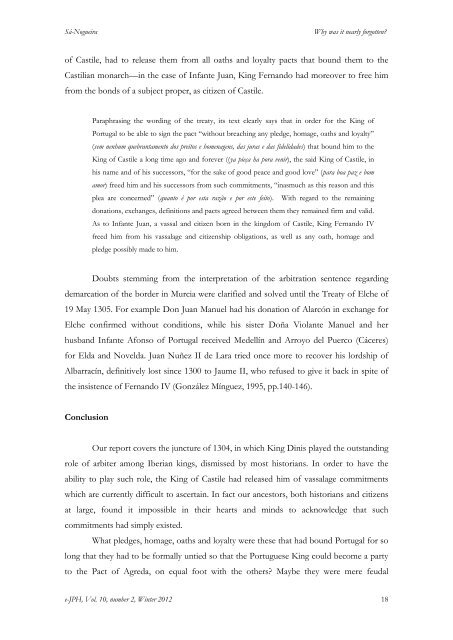Why was it nearly forgotten? The Agreda Treaty ... - Brown University
Why was it nearly forgotten? The Agreda Treaty ... - Brown University
Why was it nearly forgotten? The Agreda Treaty ... - Brown University
You also want an ePaper? Increase the reach of your titles
YUMPU automatically turns print PDFs into web optimized ePapers that Google loves.
Sá-Nogueira<br />
<strong>Why</strong> <strong>was</strong> <strong>it</strong> <strong>nearly</strong> <strong>forgotten</strong>?<br />
of Castile, had to release them from all oaths and loyalty pacts that bound them to the<br />
Castilian monarch—in the case of Infante Juan, King Fernando had moreover to free him<br />
from the bonds of a subject proper, as c<strong>it</strong>izen of Castile.<br />
Paraphrasing the wording of the treaty, <strong>it</strong>s text clearly says that in order for the King of<br />
Portugal to be able to sign the pact “w<strong>it</strong>hout breaching any pledge, homage, oaths and loyalty”<br />
(sem nenhum quebrantamento dos pre<strong>it</strong>os e homenagens, das juras e das fidelidades) that bound him to the<br />
King of Castile a long time ago and forever ((ya pieça ha pora venir), the said King of Castile, in<br />
his name and of his successors, “for the sake of good peace and good love” (para boa paz e bom<br />
amor) freed him and his successors from such comm<strong>it</strong>ments, “inasmuch as this reason and this<br />
plea are concerned” (quanto é por esta razão e por este fe<strong>it</strong>o). W<strong>it</strong>h regard to the remaining<br />
donations, exchanges, defin<strong>it</strong>ions and pacts agreed between them they remained firm and valid.<br />
As to Infante Juan, a vassal and c<strong>it</strong>izen born in the kingdom of Castile, King Fernando IV<br />
freed him from his vassalage and c<strong>it</strong>izenship obligations, as well as any oath, homage and<br />
pledge possibly made to him.<br />
Doubts stemming from the interpretation of the arb<strong>it</strong>ration sentence regarding<br />
demarcation of the border in Murcia were clarified and solved until the <strong>Treaty</strong> of Elche of<br />
19 May 1305. For example Don Juan Manuel had his donation of Alarcón in exchange for<br />
Elche confirmed w<strong>it</strong>hout cond<strong>it</strong>ions, while his sister Doña Violante Manuel and her<br />
husband Infante Afonso of Portugal received Medellín and Arroyo del Puerco (Cáceres)<br />
for Elda and Novelda. Juan Nuñez II de Lara tried once more to recover his lordship of<br />
Albarracín, defin<strong>it</strong>ively lost since 1300 to Jaume II, who refused to give <strong>it</strong> back in sp<strong>it</strong>e of<br />
the insistence of Fernando IV (González Mínguez, 1995, pp.140-146).<br />
Conclusion<br />
Our report covers the juncture of 1304, in which King Dinis played the outstanding<br />
role of arb<strong>it</strong>er among Iberian kings, dismissed by most historians. In order to have the<br />
abil<strong>it</strong>y to play such role, the King of Castile had released him of vassalage comm<strong>it</strong>ments<br />
which are currently difficult to ascertain. In fact our ancestors, both historians and c<strong>it</strong>izens<br />
at large, found <strong>it</strong> impossible in their hearts and minds to acknowledge that such<br />
comm<strong>it</strong>ments had simply existed.<br />
What pledges, homage, oaths and loyalty were these that had bound Portugal for so<br />
long that they had to be formally untied so that the Portuguese King could become a party<br />
to the Pact of <strong>Agreda</strong>, on equal foot w<strong>it</strong>h the others? Maybe they were mere feudal<br />
e-JPH, Vol. 10, number 2, Winter 2012 18
















